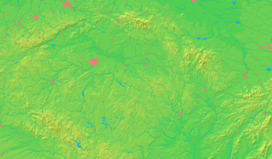Český les Protected Landscape Area
| Český les | |
| Protected Landscape Area | |
_-_typical_landscape.jpg) Typical landscape in CHKO Český les | |
| Country | Czech Republic |
|---|---|
| Region | Pilsen |
| Highest point | Čerchov |
| - elevation | 1,042 m (3,419 ft) |
| - coordinates | CZ 49°23′0.06″N 12°47′1.38″E / 49.3833500°N 12.7837167°E |
| Length | 65 km (40 mi), NW-SE |
| Width | 10 km (6 mi), SW-NE |
| Area | 473.42 km2 (182.79 sq mi) |
| Founded | 2005 |
| Management | Správa CHKO Český les |
| - location | Přimda |
 _-_location_map.svg.png) Location of Český les in the Czech Republic | |
Český les Protected Landscape Area (Czech: Chráněná krajinná oblast Český les, usually abbreviated as CHKO Český les, the name can be translated as Bohemian Forest) is a Protected Landscape Area in the Czech Republic. It lies in the western part of the Pilsen Region along the border with the German state of Bavaria. It protects the most valuable parts of the range of the same name, the Český les, which bears the name Oberpfälzer Wald in Germany.
CHKO Český les was declared in 2005 as the 25th Protected Landscape Area of the Czech Republic. Most of the area was vacated after the forced expulsion of the predominantly German inhabitants after the World War II. Until the fall of the Communist regime in 1989 it was part of the Western border zone, virtually uninhabited. Due to this development it is today an area little affected by human activities, a mosaic of deep forests, meadows and forests. There are many valuable well-preserved habitats of the beech and mixed fir-beech forests (though replaced by spruce plantations in a large part of the original area), bog spruce forests and bog Mountain Pine forests. Geologically the area is not much varied, with the nutrient deficient rocks of the so-called Moldanubicum pluton of Paleozoic to Proterozoic origin (granites, gneiss, schists, slates). CHKO Český les covers an area of 473.42 km2 (182.79 sq mi).
There are no permanent settlements in the area, rather a few restored hamlets and many of the meadows and pastures are now used for cattle raising. The protected area is divided in two parts separated by the D5 highway connecting the Czech Republic and Germany. The zone close to the highway was not included in the protected area.
Nature Reserves
As of February 2007 there were following Nature Reserves and other smaller protected areas within the CHKO Český les:
| Name | Type | Area | Reason for protection | |
|---|---|---|---|---|
| Broumovská bučina | Nature Reserve | 26.17 ha | 64.7 acres | herb-rich beech forest |
| Bučina u Žďáru | Nature Reserve | 6.77 ha | 16.7 acres | acidophilous montane beech forest |
| Bystřice | Nature Reserve | 43.61 ha | 107.8 acres | mixed montane forest |
| Čerchovské hvozdy | National Nature Reserve | 326.93 ha | 807.9 acres | primal mixed beech forest |
| Diana | Nature Reserve | 20.41 ha | 50.4 acres | primeval herb-rich forest |
| Dlouhý vrch | Nature Reserve | 21.00 ha | 52 acres | montane sycamore-beech forest |
| Farské bažiny | Nature Reserve | 66.00 ha | 163 acres | bog spruce forest |
| Hvožďanská louka | Nature Monument | 6.70 ha | 16.6 acres | managed meadow |
| Jezírka u Rozvadova | Nature Reserve | 6.23 ha | 15.4 acres | peat bog |
| Křížový kámen | Nature Reserve | 19.23 ha | 47.5 acres | raised bog forest with peat lakes |
| Louka u Staré Huti | Nature Monument | 2.07 ha | 5.1 acres | managed bog meadow |
| Malý Zvon | Nature Reserve | 8.00 ha | 20 acres | autochthonous beech forest |
| Milov | Nature Monument | 0.74 ha | 1.8 acres | sloped spring peat bog |
| Na požárech | National Nature Monument | 78.60 ha | 194.2 acres | transitional bog (originally declared for grouse protection) |
| Nad Hutí | Nature Reserve | 14.04 ha | 34.7 acres | autochthonous beech forest |
| Ostrůvek | Nature Reserve | 5.51 ha | 13.6 acres | raised bog forest |
| Pavlova Huť | Nature Reserve | 35.82 ha | 88.5 acres | bog spruce forest |
| Pleš | Nature Reserve | 27.69 ha | 68.4 acres | ravine sycamore and sloped beech forest |
| Podkovák | Nature Reserve | 5.63 ha | 13.9 acres | raised bog forest |
| Skalky na Sádku | Nature Monument | 3.89 ha | 9.6 acres | spruce-beach forest |
| Starý Hirštejn | Nature Reserve | 37.15 ha | 91.8 acres | autochthonous mixed forest |
| Tišina | Nature Reserve | 10.35 ha | 25.6 acres | acidophilous montane beech forest |
| Tři Znaky | Nature Reserve | 289.86 ha | 716.3 acres | declaration pending |
| Veský mlýn | Nature Monument | 32.04 ha | 79.2 acres | transitional bog |
Resources
- "Český les PLA". Agency for Nature Conservation and Landscape Protection of the Czech Republic. Retrieved 2007-03-06.
- Chytrý, Milan (2001). Katalog biotopů české republiky. Praha: Agentura ochrany přírody a krajiny ČR. ISBN 80-86064-55-7.